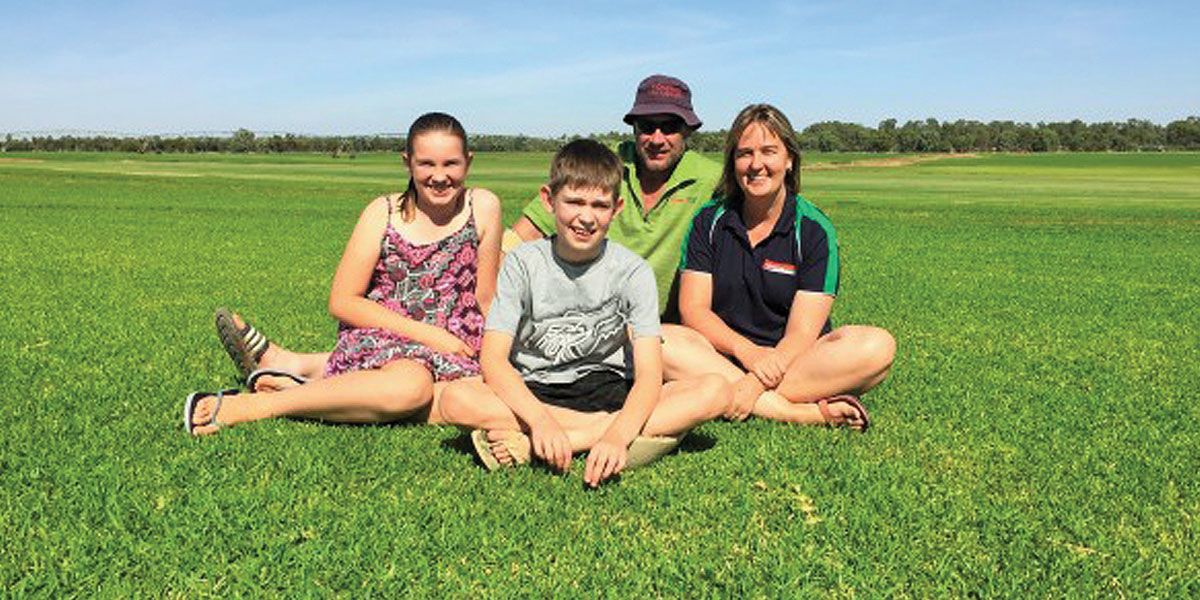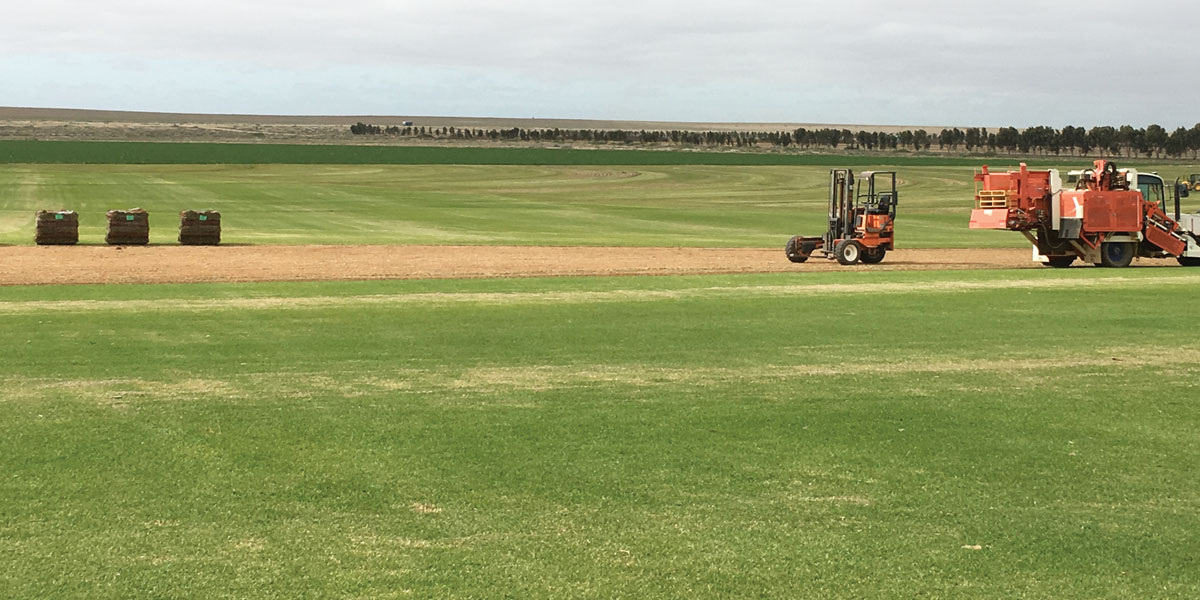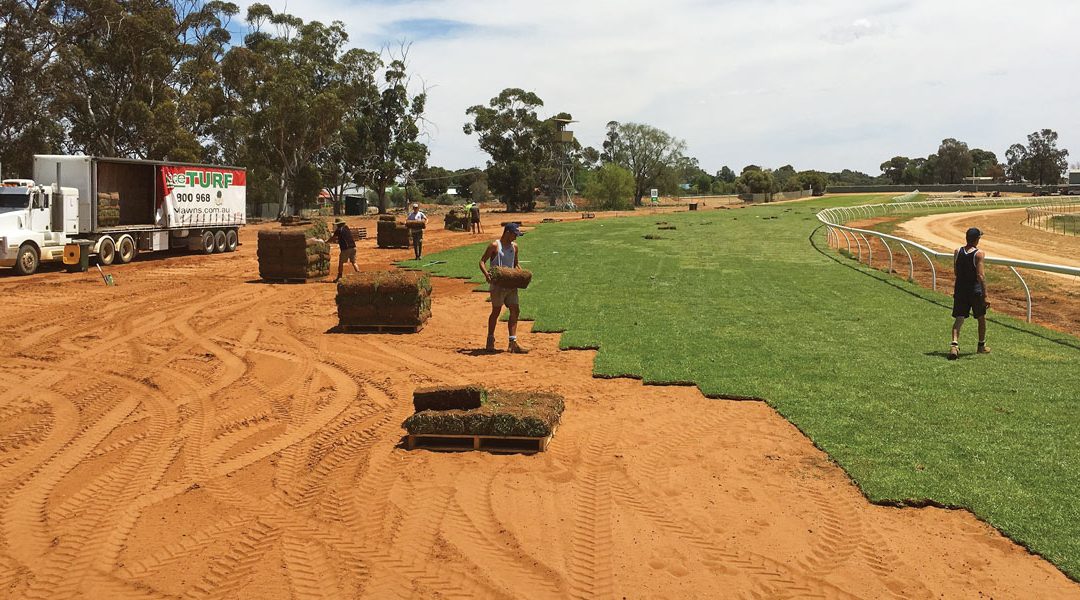Above: In November, Advance Turf completed their biggest order to date: supplying and laying 12,000 m2 of turf over three days as part of a track upgrade at the Swan Hill Racecourse.
The phone has been running hot in the office at Advance Turf. It’s peak season for frantic homeowners desperate to have their gardens picture perfect for Christmas. Fortunately for them, Advance Turf specialises in short notice orders which are taken online and by phone. Sandra Godwin speaks to husband and wife team Chris and Joanna Hulland who have built-up an enviable reputation for prompt delivery and exceptional service since they bought the business in 2007.

Above: A family venture – Joanna and Chris with their children.
Advance Turf grows five varieties of turf, including Palmetto Soft Leaf Buffalo, across 64 hectares on the farm, about 10 kilometres northeast of the Murray River town of Swan Hill in Victoria.
The area is well-known for its Mediterranean climate, boasting more hours of sunshine than Queensland, which encourages healthy plant growth with minimal losses from pests and disease.
But as all growers know, Mother Nature can be fickle and 2018 has been an incredibly dry year.
A complex web of state and federal government rules about irrigation storage, entitlements and environmental water resulted in a zero allocation for irrigators in the region, including the Hullands.
“So we spent more than $1 million buying extra high-security and temporary water that we could use this year and next year,” Joanna said. “Without it, we could not have stayed in business, but it’s not a cost that can be passed on to customers.”
Advance Turf supplies several regular buyers, such as landscape gardeners. Most sales are to retail customers in Melbourne and across regional Victoria and southern and western New South Wales.
About 75% of orders are trucked more than 350km south to Australia’s most densely populated capital city. Despite the distance, Melbourne orders placed by 10am are delivered the next day, six days a week.
Joanna, an accountant with an eye for a pattern, says she’s found the retail buyers have different expectations, depending on whether they’re located in the city or the country.
“That’s the part I enjoy most – the great relationships we have with satisfied retail customers who appreciate the role we play in enhancing their lives by providing them with a good product so their kids can play happily in the back yard.”
“Country clients are more understanding and more flexible about delivery times,” she said. “City customers are more demanding – they want it now – and they’re extremely naïve about the care needed by a living product such as turf.”
Joanna said many Melbourne customers, particularly cultures new to our country who have lived only in big cities, did not understand turf requires regular watering.
“They see advertising that says Buffalo is drought-tolerant and think that means they don’t have to water it at all,” she said. “They also don’t understand that turf needs to be laid straight away, not left to sit on the cement for a few days until they get around to it.”
To address this challenge, Joanna said first-time buyers were taken through the basics on the phone and written information was provided with each order. The Advance Turf website also has a comprehensive guide to turf care and there are plans to produce some educational videos “when we have time”.
Joanna said it was important to develop a good rapport with customers.
“That’s the part I enjoy most – the great relationships we have with satisfied retail customers who appreciate the role we play in enhancing their lives by providing them with a good product so their kids can play happily in the back yard,” she said .
Chris, on the other hand, takes pride in using the agronomic knowledge he gained from growing-up on a broadacre farming property at Patchewollock (in northwest Victoria) and later managing a family irrigation farm near Swan Hill.
“There’s nothing quite like seeing crops, whether they’re turf or grain, growing well,” he said.
A typical day on the farm starts after dark when water is pumped from the nearby Murray River to a holding creek, before it is distributed to the two centre-pivot irrigators that ensure the turf receives enough water each night.
The turf is mowed twice a week during the growing season and cut each day using Trebro slab and roll harvesting machines.
Pallets of turf are collected from the farm each afternoon by a contracted freight company and sent to a depot at Sunshine West. The next morning the pallets are reloaded onto smaller trucks with mounted forklifts and delivered around the city.
Customers receive a text message the day before delivery with an expected delivery time, which is accurate “within half an hour either side of the expected time”.
Advance Turf also has several forklift-mounted semi-trailers for freighting larger orders direct to the site.
In November, they completed their biggest order to date: supplying and laying 12,000 square metres of turf over three days as part of a track upgrade at the Swan Hill Racecourse.
Each January, for a week or more, cutting is halted when daily temperatures reach 40 degrees C, because of the impact of extreme heat on shelf life.
Turf production also stops during the colder months when most turf varieties are dormant and sales are limited.
The permanent workforce then turns its focus to the Hullands’ 2800ha dryland farm near Ultima, about 35km west of Swan Hill, which produces grain and fodder crops, including wheat, barley and vetch, as well as cattle and prime lambs.
Joanna said the grain farm was not a significant contributor to the finances of their enterprise, but it was important to be able to offer employees the security of year-round work.
The Hullands’ children, Ryan and Sarah, were toddlers when the family moved to the turf farm.
Now teenagers, they know how to make themselves useful, chipping-in to pick up scraps and help drive machinery or trucks when things get busy.
Advance Turf employs five permanent staff and another three casuals during summer. It takes at least two people in the office to keep-up with processing orders and answering the phones, averaging 50 calls a day.
“We’re fortunate to have a great team around us,” Joanna said.
“It’s not something you can do on your own.” TB

If you want to talk to Chris and Joanna Hulland about this story they can be contacted via M: 0439 889 323.

